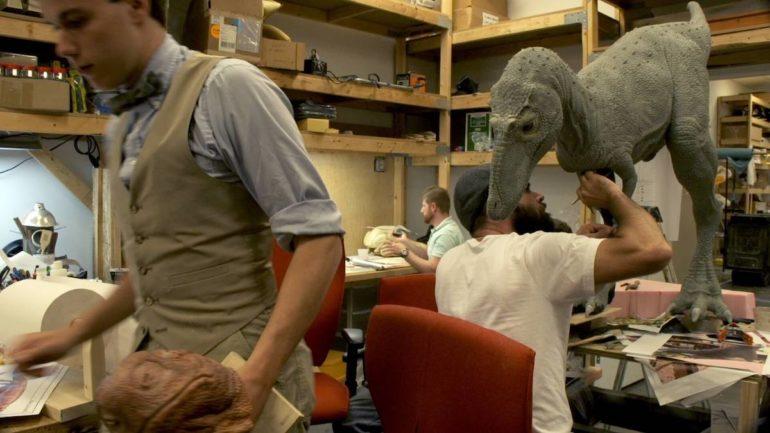Film Review: ‘We Believe in Dinosaurs’
By Dennis Harvey
LOS ANGELES (Variety.com) – This summer will see the 50th anniversary of the Apollo 11 moon landing. It may also provide opportunity to meditate upon the fact that an awed populace back then could hardly have imagined an American near-future in which anti-science sentiments would become so widespread, particularly at the highest levels of a government that once rated NASA as a top priority.
Adding to that discussion is Monica Long Ross and Clayton Brown’s documentary “We Believe in Dinosaurs.” Attempting to portray both sides even-handedly (though a principal figure presumably refused to be interviewed), it offers not so much a critique as a slightly bemused observation of the Ark Encounter, a Biblical theme park-style attraction in Kentucky designed to promote a creationist rather than scientific view of Earth’s history — which spans about 6,000 years, in this reckoning.
The peculiar brand of pseudoscience utilized to provide supporting “evidence” is controversial, needless to say. So is the “separation of church and state” breach many view in such projects getting de facto governmental approval. Often amusing, but never condescending towards either Ark proponents or their equally vocal opponents, this feature should attract interest from various exhibition channels — perhaps particularly abroad, where admittedly it will not do Americans’ current popular image any favors.
The purported $150 million Ark is less than an hour’s drive from the Creation Museum, an attraction also built by Australian-born Christian fundamentalist Ken Ham’s Answers in Genesis organization. Legally a nonprofit, AIG nonetheless runs these businesses (as well as numerous ministerial and educative endeavors worldwide), selling them to local authorities as job-generating investments of a purely commercial “entertainment” nature, while on the other hand telling the faithful that they are very much intended to “evangelize.”
This creates a slippery-slope conflict, in that foes cry foul over taxpayer funds supporting what they view as a clear vehicle for religious propaganda. Such pressure at one point lost the Ark its projected $18 million in state tax incentives, to Ham’s loud consternation. But a higher court reversed that decision, and the current Governor makes no secret of his support. As a result, the impressively scaled “Encounter” duly opened two years ago, an event recorded here — as are the protests and counter-protests that were kept a polite distance away by police.
Before the film reaches that juncture, we get a good look not only at the world of “Young Earth creationists” and their logic (which extends to quasi-scientific academic conferences), but at individual players on both sides of the fight. Lead designer Patrick Marsh and artisan Doug Henderson are among the affable personnel who found their “dream job” creating a facsimile of Noah’s Ark, which requires some interesting imaginative leaps not found in the Bible.
Not least among those leaps is the depiction of dinosaurs and other extinct (as well as some murkily confabulated) creatures as passengers, since it’s the belief of creationists that fossil-record species simply died during, or shortly after, the Flood. It is also interesting to see the attraction’s PG-13 diorama of the decadence that triggered God’s watery wrath. There are even animatronic figures used to address such philosophical quandaries as, “Why does a loving God allow so much death and suffering?”
On the other side of the divide are people like paleontologist Dan Phelps (who points out that roadside Kentucky shale offers ample proof of Earth’s great age) and David MacMillan, a teenage evangelical and Creation Museum charter member who now runs an anti-Creationist website. He sees no conflict between his continued Christian beliefs and acquired trust in science, resenting that faulty creationist “evidence” gets shoved down many a gullible schoolchild’s throat. Farther out among the opposition are members of the Tri-State Free Thinkers, atheists who (not without humor) claim the Biblical story of Noah promotes “genocide and incest.”
Caught in the middle are residents of Williamstown, the quaint but economically flagging burg, who dearly hope the Ark’s arrival just outside its limits will be a boon for business. Yet while the attraction itself appears to be a hit, it turns out precious few visitors bother patronizing anything else in the area before driving home.
Without laying on any overt message, “We Believe in Dinosaurs” does definitely suggest that this eccentric collision between faith and secularism, commerce and politics — one that might have seemed wholly outlandish not long ago—is kinda-sorta the direction in which our republic is now headed. Politicians increasingly bend to accommodate religious causes, with judiciary right behind them. Science denial is a trend, whether the motivation is Biblical literalism or simple capitalist greed.
We see Ken Ham (who presumably refused to be interviewed by the filmmakers) selling his wares every which way, using whatever terminology will gain acceptance with a particular audience, but always advancing the creationist cause. That the wind is blowing in his direction is underlined by a closing-credits compilation of recent American politicos publicly distancing themselves from (or outright decrying) evolutionary theory.
Though mostly comprised of polished vérité footage, the documentary also has room for a colorful diversity of promotional materials, archival nature and space photography, and more. The smartly assembled package is complemented by Kate Simko’s original score, which provides electronic textures with an occasional hint of gamelan.

